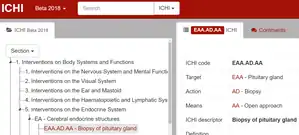International Classification of Health Interventions
The International Classification of Health Interventions (ICHI) is a system of classifying procedure codes being developed by the World Health Organization (WHO). It is currently only available as a beta release for additional coding work, and not yet ready for operational application.[1] The last published version is denoted as beta version 2018[2] The multiaxial classification system has now reached a phase that the testing period for use in healthcare area is approaching during 2018. Updates on development and status of the classification are listed on WHO home page.[3]
History
International Classification of Procedures in Medicine
The International Classification of Procedures in Medicine (ICPM) was a system of classifying procedure codes published by the World Health Organization from 1978, but never received the same international acceptance as ICD-9. Due to difficulties in the consultation processes, international development of the work effectively stopped in 1989.[4] As a result, most nations developed their own standards for coding procedures and interventions incompatible to the ICPM approach. Germany's OPS-301 is based on the Dutch extension of ICPM; the ICPM-DE.[5]
Since 2012, the WHO began developing a replacement for ICPM called the International Classification of Health Interventions (ICHI). For those countries who didn't go on to develop their own classification of interventions, the WHO have generated a short list of procedure codes based on ICD-10-AM as an interim measure.
Identifiers
ICHI is using letters to identify a procedure. For example, code EAA.AD.AA is for Biopsy of Pituitary gland.

Relationship to SNOMED CT (procedures hierarchy)
Some procedural concepts that are present in SNOMED CT do not have a corresponding concept in ICHI (e.g., endoscopy).[6][7] SNOMED CT is using attributes that may link procedures to other related concepts. For example, SNOMED CT concept model for procedure allows linking substances to procedures using 'Direct Substance' attribute. The scope for the set of relationships in ICHI is smaller compared to SNOMED CT.
Development
The alpha version of WHO's ICHI was largely derived from the Australian Classification of Health Interventions (ACHI),[8] a portion of the Australian standard ICD-10-AM, which in turn was largely derived from ICD-10 and the United States extension ICD-9-CM. Currently (2014) the acceptance of the ICHI in the community of health care professionals might be better, but due to missing formal acceptance the spread of national variations beyond translation widely continues.
For accounting, the Australian health administration generated a code of Diagnosis-related groups which in effect again deviates from the WHO basis. The same phenomenon applies to DRG codes in Germany and other countries. Other codes generated by the UN accredited International Standards Organisation ISO defined a deviating scope.[9] Cooperation of ISO and WHO is not detected.
See also
- ICD-10-PCS (US-American version for coding)
- Clinical coding
- Diagnosis codes
- Medical classification
References
- ↑ ICHI status of WHO Tokyo meeting 2010
- ↑ https://mitel.dimi.uniud.it/ichi/
- ↑ "International Classification of Functioning, Disability and Health (ICF)".
- ↑ "International Classification of Health Interventions (ICHI)". World Health Organization - Classifications. Retrieved 26 April 2015.
- ↑ "DIMDI - OPS - German Procedure Classification". www.dimdi.de. Retrieved 9 December 2016.
- ↑ Thun, S.; Dewenter, H. (2018). "ICD-11, ICHI and SNOMED CT-What do the standards mean for eHealth applications?". Bundesgesundheitsblatt, Gesundheitsforschung, Gesundheitsschutz. 61 (7): 812–820. doi:10.1007/s00103-018-2759-2. PMID 29846742. S2CID 44176523.
- ↑ Rodrigues, JM; Kim, S; Trombert Paviot, B; Lee, JJ; Aljunid, S (2017). "How to Link SNOMED CT Procedure and WHO International Classification of Health Interventions (ICHI)". Studies in Health Technology and Informatics. 236: 40–47. PMID 28508777.
- ↑ ICHI alpha version
- ↑ ISO 9999:2011. Assistive products for persons with disability -- Classification and terminology
External links
- WHO site (International framework for coding, evolution of ICHI paused)
- Australian site (Australian version for coding)